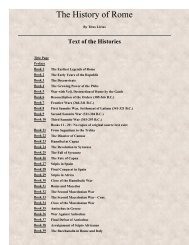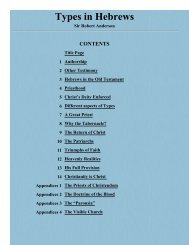The Person of the Holy Spirit - Table of Contents
The Person of the Holy Spirit - Table of Contents
The Person of the Holy Spirit - Table of Contents
Create successful ePaper yourself
Turn your PDF publications into a flip-book with our unique Google optimized e-Paper software.
Scripture, that Job is here indicating knowledge given to men before Scripture was written. His view is in harmony with<br />
o<strong>the</strong>r Scripture in any case.<br />
In Job 33:4, Elihu is revealed to have said, “<strong>The</strong> <strong>Spirit</strong> <strong>of</strong> God hath made me, and <strong>the</strong> breath <strong>of</strong> <strong>the</strong> Almighty hath given me<br />
life.” <strong>The</strong> same problem exists here as in Job 26:13. It is probable that his statement is entirely accurate as it is in keeping<br />
with <strong>the</strong> Genesis account <strong>of</strong> creation. Coupled with <strong>the</strong> o<strong>the</strong>r explicit references to <strong>the</strong> creative work <strong>of</strong> <strong>the</strong> <strong>Spirit</strong>, <strong>the</strong><br />
Scriptures examined sustain <strong>the</strong> doctrine and furnish sufficient pro<strong>of</strong> for <strong>the</strong> spiritual mind.<br />
A second important line <strong>of</strong> pro<strong>of</strong> for <strong>the</strong> creative work <strong>of</strong> <strong>the</strong> <strong>Holy</strong> <strong>Spirit</strong> is found in <strong>the</strong> use <strong>of</strong> <strong>the</strong> word ••••• for <strong>the</strong> Creator.<br />
<strong>The</strong> term is patently plural as evidenced by its use in reference to <strong>the</strong> plurality <strong>of</strong> hea<strong>the</strong>n gods. During <strong>the</strong> last century many<br />
have tried to explain away this evidence for <strong>the</strong> Trinity in <strong>the</strong> Old Testament, speaking <strong>of</strong> this use <strong>of</strong> <strong>the</strong> plural as <strong>the</strong> plural<br />
<strong>of</strong> majesty, citing <strong>the</strong> English idiom <strong>of</strong> waters (plural) for water (singular) in poetic expression to give <strong>the</strong> impression <strong>of</strong><br />
greatness or extent. In view <strong>of</strong> <strong>the</strong> abundant testimony to <strong>the</strong> Trinity not only in <strong>the</strong> New Testament but in <strong>the</strong> Old Testament<br />
as well, it is incredible that a name for God should not be used which should express <strong>the</strong> plural idea <strong>of</strong> <strong>the</strong> <strong>Person</strong>s <strong>of</strong> <strong>the</strong><br />
Godhead. Not a single good reason has ever been advanced for not regarding this plural as genuine. <strong>The</strong> arguments against it<br />
have been largely assumption, and in some cases, prejudiced-an effort to sustain <strong>the</strong> unscriptural idea that <strong>the</strong> revelation <strong>of</strong><br />
God in <strong>the</strong> Bible is evolutionary, <strong>the</strong> Old Testament being inferior to <strong>the</strong> New. It is true that revelation is progressive, but <strong>the</strong><br />
God <strong>of</strong> Genesis is <strong>the</strong> same God as is revealed in Revelation. <strong>The</strong> plural term for God thus found so prominently in <strong>the</strong><br />
creation narrative constitutes an important contribution to <strong>the</strong> creative work <strong>of</strong> <strong>the</strong> <strong>Holy</strong> <strong>Spirit</strong>. Every use <strong>of</strong> <strong>the</strong> term implies<br />
a work not only <strong>of</strong> any one <strong>Person</strong>, but <strong>of</strong> all three <strong>Person</strong>s. Hence, in Genesis 1:1, where it speaks <strong>of</strong> God creating, it is<br />
speaking <strong>of</strong> <strong>the</strong> Trinity explicitly, not only conceived <strong>of</strong> as one Essence, but as <strong>the</strong> Triune God. Every work attributed to<br />
God under this term is accordingly an assertion <strong>of</strong> a ministry <strong>of</strong> <strong>the</strong> <strong>Holy</strong> <strong>Spirit</strong>. If we had no o<strong>the</strong>r reference to <strong>the</strong> creative<br />
work <strong>of</strong> <strong>the</strong> <strong>Holy</strong> <strong>Spirit</strong> than this use <strong>of</strong> <strong>the</strong> plural term, it would justify <strong>the</strong> doctrine, even though it would not reveal<br />
anything distinctive concerning <strong>the</strong> <strong>Spirit</strong>.<br />
In addition to <strong>the</strong> explicit references <strong>of</strong> Scripture and <strong>the</strong> argument from <strong>the</strong> plural title <strong>of</strong> God in <strong>the</strong> creation narratives, a<br />
third line <strong>of</strong> evidence must be considered as <strong>of</strong>fering fur<strong>the</strong>r witness to <strong>the</strong> creative work <strong>of</strong> <strong>the</strong> <strong>Holy</strong> <strong>Spirit</strong>. <strong>The</strong> Scriptures<br />
reveal <strong>the</strong> <strong>Holy</strong> <strong>Spirit</strong> as being immanent in creation. His presence presumes <strong>the</strong> assumption <strong>of</strong> a great work, as for instance,<br />
<strong>the</strong> presence <strong>of</strong> Christ in <strong>the</strong> flesh on earth presumed a work in <strong>the</strong> flesh for man. <strong>The</strong> presence <strong>of</strong> <strong>the</strong> <strong>Holy</strong> <strong>Spirit</strong> is<br />
expressly mentioned in Genesis 1:2.<br />
It is clear from Scripture that, in addition to a relation <strong>of</strong> being <strong>the</strong> Cause for all creation, God bears to creation <strong>the</strong> tw<strong>of</strong>old<br />
relationship <strong>of</strong> transcendence and immanence. In relation to creation, God is greater than and beyond all finite and material<br />
bounds and thus is transcendent. His transcendence is essential to <strong>the</strong> cosmological argument. His immanence is essential to<br />
His work in creation, not only in <strong>the</strong> original act, but in <strong>the</strong> preservation <strong>of</strong> it and in all His providential dealings with it. <strong>The</strong><br />
deists, <strong>of</strong> course, held that God is Creator, and that He is transcendent without being immanent. <strong>The</strong> pan<strong>the</strong>ists on <strong>the</strong> o<strong>the</strong>r<br />
hand have affirmed His immanence without His transcendence. Both affirm His relation to creation, however imperfectly,<br />
but nei<strong>the</strong>r view has stood <strong>the</strong> test <strong>of</strong> ei<strong>the</strong>r reason or Scripture, as both His transcendence and immanence are essential to<br />
creation in <strong>the</strong> last analysis.<br />
In relation to <strong>the</strong> Godhead, without distinction as to <strong>Person</strong>s, <strong>the</strong> doctrine <strong>of</strong> immanence has a vital bearing on <strong>the</strong> doctrine<br />
<strong>of</strong> creation. It is generally accepted that God was present in <strong>the</strong> realm <strong>of</strong> that which He created. If this argument is sustained<br />
in relation to <strong>the</strong> Trinity, it is equally applicable to any <strong>Person</strong> <strong>of</strong> <strong>the</strong> Trinity. On <strong>the</strong> basis <strong>of</strong> <strong>the</strong> doctrine <strong>of</strong> <strong>the</strong> immanence<br />
<strong>of</strong> <strong>the</strong> <strong>Holy</strong> <strong>Spirit</strong>, we may assume that <strong>the</strong> <strong>Holy</strong> <strong>Spirit</strong> had a part in <strong>the</strong> creative work. <strong>The</strong> express declaration <strong>of</strong><br />
immanence in connection with <strong>the</strong> creation narrative (Gen 1:2) is convincing. While this argument might not be sufficient<br />
alone, it does add to <strong>the</strong> strength <strong>of</strong> o<strong>the</strong>r evidence.<br />
From <strong>the</strong> threefold pro<strong>of</strong> <strong>of</strong> <strong>the</strong> creative work <strong>of</strong> <strong>the</strong> <strong>Holy</strong> <strong>Spirit</strong>, we build <strong>the</strong> doctrine <strong>of</strong> His work in creation. Fur<strong>the</strong>r<br />
examination <strong>of</strong> Scripture texts will reveal a definite character to His creative work.<br />
2. <strong>The</strong> Nature <strong>of</strong> <strong>the</strong> Creative Work <strong>of</strong> <strong>the</strong> <strong>Holy</strong> <strong>Spirit</strong>.








